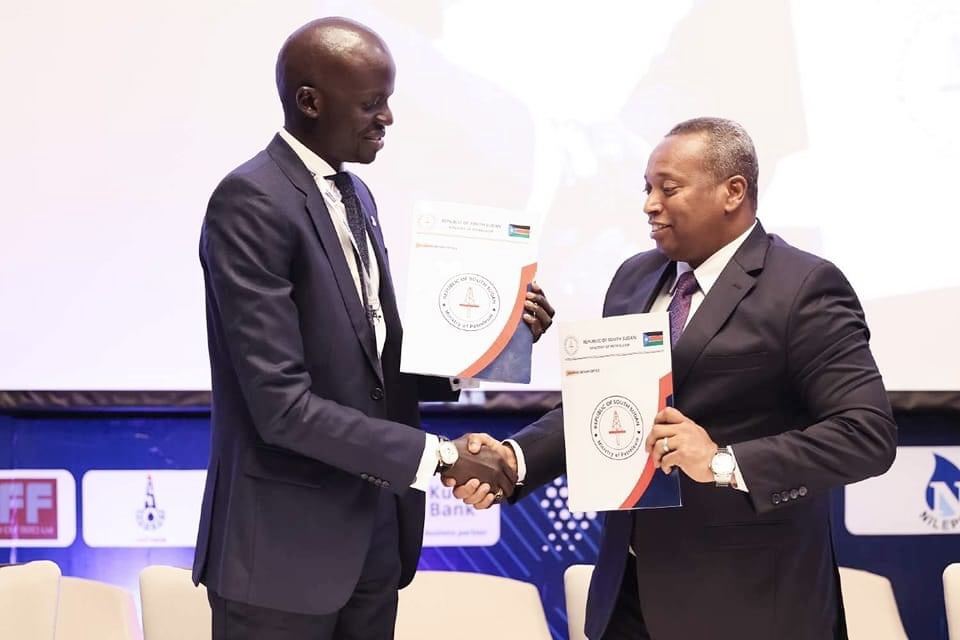South Sudan & Djibouti have signed memorandum of understanding (MoU) to boost collaboration in the areas of energy, investment and trade. The agreement will enable South Sudan to access international markets through Djibouti Port. South Sudan considers Djibouti Port as third international trade route to import and export goods in addition to Port Sudan and Mombasa Port.
The energy sector advancing deal was signed during fifth edition of South Sudan Oil & Power conference and exhibition by Hon. Puot Kang Chol, South Sudan’s Minister of Petroleum, and Hon. Yonis Ali Guedi, Djibouti’s Minister of Energy & Natural Resources. Landlocked South Sudan will benefit from this regional cooperation agreement with Djibouti because it will have alternative route to export its resources to the international markets via Djibouti Port.
“The agreement we have signed is a cooperation agreement between the Republic of South Sudan and Djibouti in the area of oil and gas. What is important is the fact that we are very interested in opening rooms, not only to us, but to all South Sudanese. As a landlocked country, without access to the rest of the world we will not be able to export. Now, with the MoU, we have three routes. Through Sudan, Kenya and now, Ethiopia through Djibouti,” stated Hon. Puot Kang.
According to Hon. Puot Kang, the signing of MoU with Djibouti will allow South Sudanese citizens to go to Djibouti and explore opportunities as Djibouti nationals will also come and explore opportunities within South Sudan. Addressing the delegates at South Sudan Oil & Power Conference and Exhibition, Hon. Puot Kang also revealed that South Sudanese government has acquired land in Djibouti.
Hon. Puot Kang stated that the agreement is an honor to the South Sudanese investors and other businesspersons. He stressed that opening of such trade routes will ease the importation and exportation of goods to and from other countries. He also added that the government is working hard to ensure that all the seasonal routes connecting to the ports are made passable.
“We are working with the Ministry of Roads, and the Ministry of Finance to make sure that all the seasonal roads are passable whether in rain season or dry season,” said Hon. Puot Kang. He also encourages South Sudanese investors to grab this chance to explore business opportunities that are available in Djibouti and not to localise themselves in South Sudan.
“Now that we have signed this MoU, you have the opportunity to go to Djibouti and explore the opportunities that are there, as they will do the same here. You have the opportunity to operate elsewhere. We will be working closely with the country and encourage you to go there, identify opportunities and we will support you,” Hon. Puot Kang concluded.
Hon. Puot Kang urged South Sudanese investors to avoid the tendency of working against each other instead they should collaborate and consider the benefits that will be obtained by citizens of South Sudan. “You need to ask the fellow South Sudanese for the contracts because when that person gets the contract, the benefits come back to the country through taxes, services delivery, and employment.”
Hon. Yonis Ali Guedi has affirmed South Sudan to use Djibouti port and access the international market. He stated that the Republic of Djibouti is now open to all South Sudanese investors and the whole East African region as they look forward to working together to accelerate economic growth and prosperity.
Hon. Yonis Ali stated that the land that is allocated for South Sudan in Djibouti is ready and waiting for the government of South Sudan so that they can hand it over to the leadership. “Djibouti is now open to the East African market; we are waiting for all the South Sudanese investors. All the processes of land are complete and ready,” Hon. Yonis Ali stressed.
Following its independence in 2011, South Sudan has been depending on a single route to export its crude oil to international markets via the port Sudan. In addition to routes to Mombasa Port and Port Sudan, South Sudan will also have additional route to Djibouti following the signing of MoU. Based on feasibility study, Djibouti Port appears to be closer to South Sudan as compared to Mombasa Port. South Sudan started everything from scratch & is currently embarking on hydrocarbons exploration, power generation, infrastructure as well as development of renewable energy resources to accelerate economic growth & development. It is to be noted that regional cooperation will continue to play significant role in sustainable oil production in the country.

